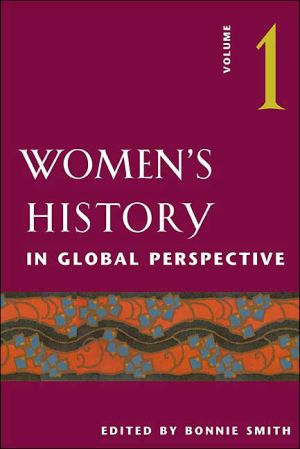

 |

|

The average rating for Women's History in Global Perspective, Vol. 1 based on 2 reviews is 3 stars.
Review # 1 was written on 2015-06-07 00:00:00 Christopher Bhattacharyya Christopher BhattacharyyaReaders unfamiliar with academic history may be surprised to hear that the second part of this title is probably more controversial than the first. Women's/gender/feminist history certainly has its detractors, but these are increasingly found only outside of the field, while even many conservative historians have come to accept (at least) that including some mention of women's experience adds seasoning to discussions of historical topics. "Global perspectives," or world/global history, may be harder to swallow. No historian, or group of historians, can truly claim to have studied the history of the entire world, even if they limit their subject area to one relatively small aspect of that world. As progressive historians become increasingly critical of narratives which focus only on Europe and the United States (or, sometimes, other Anglophone former colonies like Canada and Australia), it is of course logical to attempt to broaden that understanding by making more inclusive narratives to replace them, but can one really expect students or teachers to grasp "global" history? Many historians would say no. The historians involved in producing this volume, the first in a series of books intended to explore the subject to provide pedagogical tools for World History or World Civilization curricula, are attempting to say "yes," however. Bonnie Smith, the editor, is a first class gender historian, whose work began largely centered on Europe, but which has gradually expanded to an increasingly "global" approach. This volume offers thoughtful essays on large-scale topics such as theory, family, work, religion, and race, which affect and are affected by women throughout the world. While at times the size of the task threatens to overwhelm the authors (as in the case of the religious article, which narrows to focus on Judaism, Christianity, and Islam, missing many significant religions by definition), in general the authors do offer very broad interpretations that avoid regional-centralism. These authors include established historians like Alice Kessler-Harris and Margaret Strobel, but also lesser-known authors from varying parts of the world. I note that the later volumes in the series shifted to focusing on one region of the world at a time, so this may be the best opportunity to see women's and world history unified on a grand scale. It is worth the historian's time just to see the attempt, even if one remains skeptical of its success. |
Review # 2 was written on 2013-01-24 00:00:00 Matt Franks Matt FranksTruth be told from an academic and literary history, cultural point of departure, it indeed needs to be pointed out that many (and in particular women) scholars do tend to now consider and approach British/Canadian author and memoirist Susanna Moodie as a 19th century (and therefore early) feminist (and yes, Susanna Moodie and her sisters certainly did seem to have had both an enviable amount of both basic and advanced education, ample opportunities for writing and even having their authorial endeavours published at a time when this was not at all common for girls and women both in England and most likely globally, and furthermore that all of the Strickland sisters indeed presented for the 19th century quite emancipatory attitudes with regard to gender issues and slabery in particular). However and the above having been said, I also and personally have to admit and categorically claim that I have since I first had to in detail peruse Susanna Moodie's Roughing it in the Bush (her memoirs about immigrating to and settling with her husband in 19th century Canada) for a grade eleven English term paper on early Canadian writing considered Susanna Moodie's musings and details about her and her husband's immigrant experiences not much more than basically and sadly just a generally constant and bickering whine-fest, a litany and laundry list of one complaint after another. For while of course and naturally, settling in 19th century Canada (or rather in what would later become the country of Canada, and the province of Ontario) could be harsh and difficult, the recurring and overwhelming complaints and even at times angry outbursts seemingly always emanating from Susanna Moodie's pen in Roughing it in the Bush about basically everything from the weather to the fact that her new home was not like the genteel British countryside she and her husband had left behind upon emigration, this to and for my reading eyes (both when I read Roughing it in the Bush for school and when I recently tried a reread) have certainly and very quickly become both tedious and annoying, leaving me with the indelible and sad impression that Susanna Moodie's writing talents and her sense for and of adventure and imagination notwithstanding, she is I am sorry to say and in my opinion first and foremost a frustratingly pampered and rather spoiled British bourgeois who whines and bellyaches way way too much in Roughing it in the Bush when her immigrant and settlement experiences are not what she had assumed they would and probably should be (for it is indeed abundantly clear that Susanna Moodie obviously and wrongfully expected that her settling in the "bush" would not be all that unlike living in rural England). |
CAN'T FIND WHAT YOU'RE LOOKING FOR? CLICK HERE!!!